-
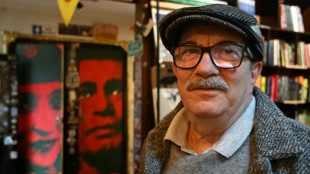 Modern-day Colombian guerrillas are mere druglords: ex-FARC commander
Modern-day Colombian guerrillas are mere druglords: ex-FARC commander
-
Australian telco giant slapped with $66 million fine over 'appalling' conduct

-
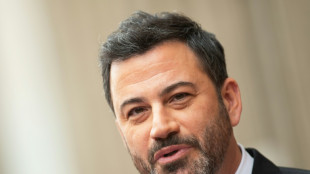 TV host Kimmel says 'anti-American' for govt to threaten comedians
TV host Kimmel says 'anti-American' for govt to threaten comedians
-
Massive sinkhole in Bangkok street forces evacuations
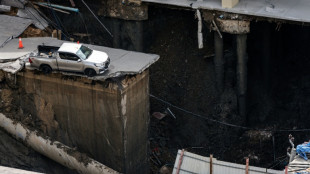
-
 Alcaraz expects Sinner to come back stronger after US Open loss
Alcaraz expects Sinner to come back stronger after US Open loss
-
Japan PM says Palestine state recognition 'when not if'
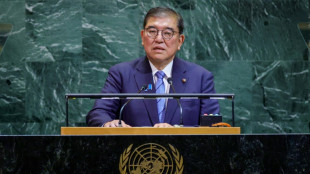
-
 14 killed by lake burst in Taiwan as Super Typhoon Ragasa wreaks havoc
14 killed by lake burst in Taiwan as Super Typhoon Ragasa wreaks havoc
-
Trump lashes out as suspended TV host Kimmel returns to air
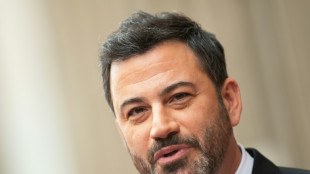
-
 Yankees clinch MLB playoff berth with walk-off win over White Sox
Yankees clinch MLB playoff berth with walk-off win over White Sox
-
Australia lose fullback Kellaway ahead of Bledisloe Cup

-
 Race for rare minerals brings boom to Tajikistan's mines
Race for rare minerals brings boom to Tajikistan's mines
-
France to host DR Congo emergency conference as Kinshasa calls for aid
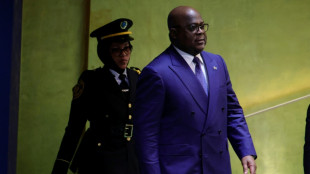
-
 Iran's carpet industry unravelling under sanctions
Iran's carpet industry unravelling under sanctions
-
No pause for food delivery riders during Pakistan's monsoon

-
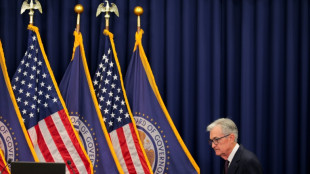 Asia markets waver after Wall St retreats from record
Asia markets waver after Wall St retreats from record
-
Brilliant Marquez poised to seal seventh MotoGP title in Japan

-
 14 killed, 124 missing in Taiwan after barrier lake burst
14 killed, 124 missing in Taiwan after barrier lake burst
-
14 killed by lake burst in Taiwan as Typhoon Ragasa wreaks havoc

-
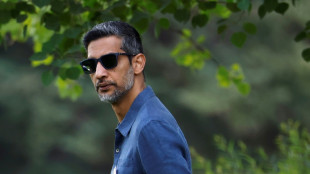 In just one year, Google turns AI setbacks into dominance
In just one year, Google turns AI setbacks into dominance
-
New York's finance sector faces risks from Trump visa crackdown

-
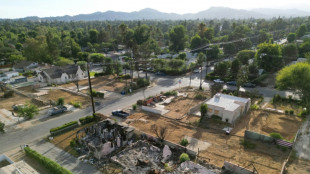 Toxic homes a lasting legacy of Los Angeles fires
Toxic homes a lasting legacy of Los Angeles fires
-
China steps into spotlight at UN climate talks

-
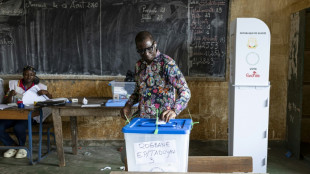 Guineans approve new constitution by wide margin, pave way for elections
Guineans approve new constitution by wide margin, pave way for elections
-
WhatsApp, Twitch among sites that could face Australia under-16s social media ban

-
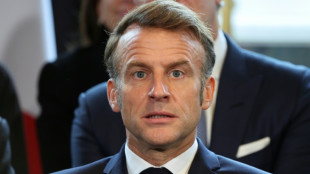 'Guess what!': Macron phones Trump after blocked by presidential convoy
'Guess what!': Macron phones Trump after blocked by presidential convoy
-
Journal retracts study linking apple cider vinegar to weight loss

-
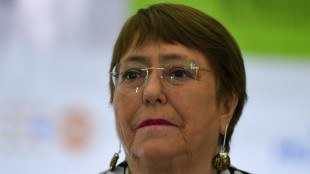 Chile puts forward ex-president Bachelet for UN top job
Chile puts forward ex-president Bachelet for UN top job
-
'We're gonna help': Trump to the rescue of struggling Argentina
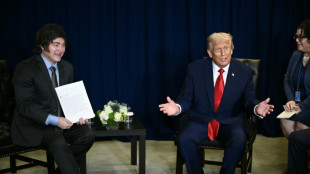
-
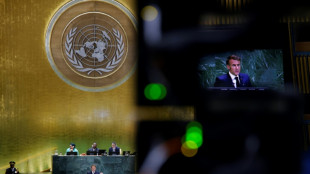 France's Macron warns against 'survival of the fittest' in world affairs
France's Macron warns against 'survival of the fittest' in world affairs
-
US hails 'gladiator' DeChambeau as Ryder Cup controversy swirls

-
 YouTube to reinstate creators banned over misinformation
YouTube to reinstate creators banned over misinformation
-
Kane 'welcome' to make Spurs return: Frank

-
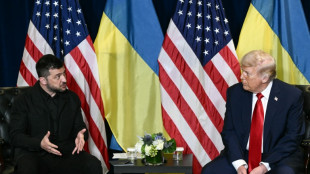 Trump says Ukraine can win back all territory, in sudden shift
Trump says Ukraine can win back all territory, in sudden shift
-
Real Madrid thrash Levante as Mbappe hits brace

-
 Isak scores first Liverpool goal in League Cup win, Chelsea survive scare
Isak scores first Liverpool goal in League Cup win, Chelsea survive scare
-
US stocks retreat from records as tech giants fall

-
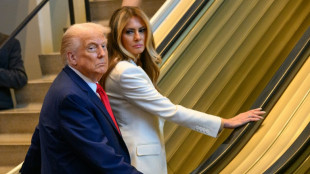 Escalatorgate: White House urges probe into Trump UN malfunctions
Escalatorgate: White House urges probe into Trump UN malfunctions
-
Zelensky says China could force Russia to stop Ukraine war
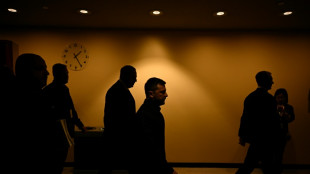
-
 Claudia Cardinale: single mother who survived rape to be a screen queen
Claudia Cardinale: single mother who survived rape to be a screen queen
-
With smiles and daggers at UN, Lula and Trump agree to meet
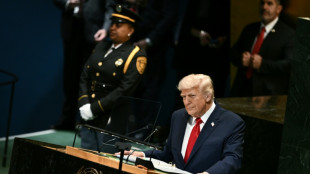
-
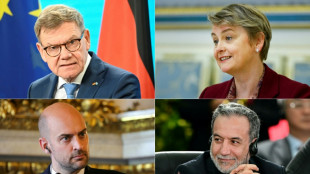 Iran meets Europeans but no breakthrough as Tehran pushes back
Iran meets Europeans but no breakthrough as Tehran pushes back
-
US veterans confident in four Ryder Cup rookies

-
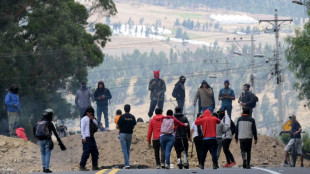 Ecuador's president claims narco gang behind fuel price protests
Ecuador's president claims narco gang behind fuel price protests
-
Qatar's ruler says to keep efforts to broker Gaza truce despite strike
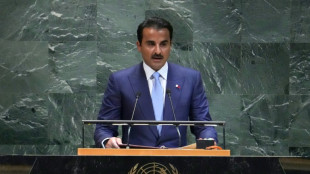
-
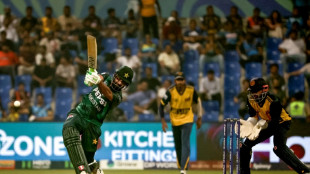 Pakistan stay alive in Asia Cup with win over Sri Lanka
Pakistan stay alive in Asia Cup with win over Sri Lanka
-
S.Korea leader at UN vows to end 'vicious cycle' with North
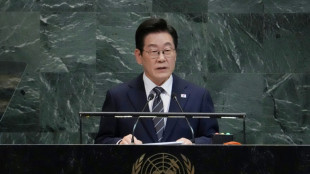
-
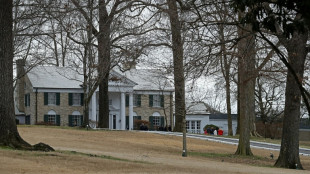 Four years in prison for woman who plotted to sell Elvis's Graceland
Four years in prison for woman who plotted to sell Elvis's Graceland
-
'Greatest con job ever': Trump trashes climate science at UN
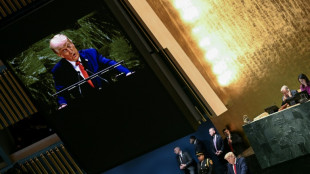
-
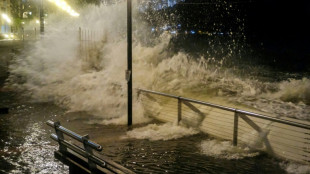 Schools shut, flights axed as Typhoon Ragasa nears Hong Kong, south China
Schools shut, flights axed as Typhoon Ragasa nears Hong Kong, south China
-
Celtics star Tatum doesn't rule out playing this NBA season

| CMSD | -0.58% | 24.32 | $ | |
| BCC | -0.6% | 78.97 | $ | |
| SCS | -0.18% | 16.87 | $ | |
| RBGPF | -1.74% | 75.29 | $ | |
| RIO | -0.13% | 63.57 | $ | |
| CMSC | -0.41% | 24.15 | $ | |
| RYCEF | 0.64% | 15.74 | $ | |
| BTI | -1.28% | 53.19 | $ | |
| NGG | 0.56% | 71.36 | $ | |
| GSK | -0.96% | 40.52 | $ | |
| JRI | 0.28% | 14.04 | $ | |
| AZN | -2.01% | 75.97 | $ | |
| BCE | 0.73% | 23.24 | $ | |
| RELX | -1.31% | 46.47 | $ | |
| VOD | -0.26% | 11.36 | $ | |
| BP | 1.07% | 34.74 | $ |
Israel's Netanyahu vows to block Iran 'nuclear weapon' as he declares victory
Israeli Prime Minister Benjamin Netanyahu declared a "historic victory" on Tuesday after agreeing a ceasefire with Iran and insisted that his country's arch-foe would never achieve a nuclear weapon.
The premier's comments, delivered in an address to the nation, came after Iranian President Masoud Pezeshkian said his country was willing to return to negotiations over its nuclear programme.
Pezeshkian insisted, however, that Iran would continue to "assert its legitimate rights" to the peaceful use of atomic energy.
"Iran will not have a nuclear weapon," Netanyahu said after the ceasefire ended 12 days of deadly air and missile strikes between the arch foes.
"We have thwarted Iran's nuclear project. And if anyone in Iran tries to rebuild it, we will act with the same determination, with the same intensity, to foil any attempt."
Israel's strikes eventually drew in the United States, which on Sunday hit Iran's underground nuclear facilities with powerful "bunker-buster" bombs that Israel lacked.
After Iran retaliated with a missile attack Monday night targeting a US base in Qatar, President Donald Trump called for de-escalation, announcing the contours of a truce deal hours later.
In a phone call Tuesday, Pezeshkian told his Emirati counterpart "to explain to them, in your dealings with the United States, that the Islamic Republic of Iran is only seeking to assert its legitimate rights".
"It has never sought to acquire nuclear weapons and does not seek them," he was quoted as saying by the official IRNA news agency, adding that Iran was "ready to resolve the issues... at the negotiating table".
Israel has said its war, which began on June 13, was aimed at preventing Iran from acquiring a nuclear weapon, an ambition Tehran has consistently denied.
Israel's military said that its strikes had set back Iran's nuclear programme "by years" and that the campaign against the country was now "entering a new phase".
After Trump angrily berated both sides for early violations of the truce on Tuesday, Tehran announced it would respect the terms of the deal if Israel did the same, while Israel said it had refrained from further strikes.
- Claims of victory -
Before Netanyahu spoke, Israel's government said its military had removed the "dual existential threat" of Iran's nuclear and ballistic missile programmes.
"We've set Iran's nuclear project back by years, and the same applies to its missile programme," Israel's chief of staff Lieutenant General Eyal Zamir said in a later statement.
Iran's top security body, meanwhile, said the Islamic republic's forces had "compelled" Israel to "unilaterally" stand down.
Its Revolutionary Guards also hailed a last-minute missile salvo fired at Israel as "a historic and unforgettable lesson to the Zionist enemy".
- Strikes on US base -
Israeli strikes hit nuclear and military targets -- killing scientists and senior military figures -- as well as residential areas, prompting waves of Iranian missile fire on Israel.
While Iran and Israel have been locked in a shadow war for decades, it has been by far the most destructive confrontation between the arch-foes.
The war culminated in US strikes on Iranian nuclear sites using massive bunker-busting bombs, followed by an Iranian reprisal targeting the largest US military facility in the Middle East.
Trump shrugged off that response as "weak", thanking Tehran for giving advance notice and announcing the outline of the ceasefire just hours later.
- 'Everyone is tired' -
Some Israelis on Tuesday welcomed the prospect of a truce.
"Everyone is tired. We just want to have some peace of mind," said Tel Aviv resident Tammy Shel, voicing hope for a lasting ceasefire. "For us, for the Iranian people, for the Palestinians, for everyone in the region."
In Iran, people remained uncertain whether the peace would hold.
Amir, 28, fled from Tehran to the Caspian Sea coast and told AFP by phone, "I really don't know... about the ceasefire but honestly, I don't think things will return to normal."
Israeli strikes on Iran have killed at least 610 civilians and wounded more than 4,700, according to the health ministry.
Iran's attacks on Israel have killed 28 people, according to official figures and rescuers.
The international community reacted with cautious optimism to the truce.
Saudi Arabia and the European Union welcomed Trump's announcement, while Kremlin spokesman Dmitry Peskov said Russia hoped "that this will be a sustainable ceasefire".
But French President Emmanuel Macron warned there was an "increased" risk that Iran would attempt to enrich uranium secretly following the strikes on its nuclear sites.
During their talks, Iran and the United States had been at odds over uranium enrichment, which Tehran considers a "non-negotiable" right and which Washington has called a "red line".
After the truce was announced, Israel's military chief Zamir said Israel's focus would now shift back to Gaza.
The Israeli opposition, the Palestinian Authority and the main group representing the families of Israeli hostages all called for a Gaza truce to complement the Iran ceasefire.
burs-dcp/kir
M.Betschart--VB
